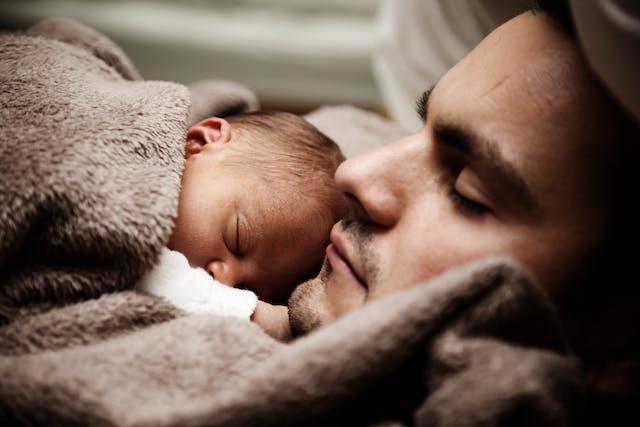Baby sleep training can be daunting. Are you still up and trying to find a way to get that baby to bed? This ultimate guide to baby sleep training is here to help you create a restful sleep routine for your little one.
Table of Contents
Understanding Infant Sleep Patterns

Before deep diving into sleep training methods, it’s crucial to grasp infant sleep patterns. Newborns have shorter sleep cycles, ranging from 30 minutes to 3 hours, with frequent awakenings due to hunger, discomfort, or the need for soothing. As babies grow, sleep cycles gradually lengthen, and they develop the ability to sleep for more extended periods. Understanding these patterns forms the foundation for crafting an effective sleep training strategy.
Creating an Eco-Friendly Sleep Environment
Natural and Organic Sleep Products
Kickstart your baby’s sleep training journey by investing in natural and organic sleep products. Opt for organic cotton crib sheets, mattress protectors, and sleepwear. These products are gentle on your baby’s delicate skin and support sustainable and chemical-free manufacturing practices.
Energy-Efficient Sleep Spaces
Harness the power of energy efficiency in your baby’s sleep space. Use LED or energy-saving bulbs, and consider using blackout curtains to regulate light exposure. Creating an energy-efficient environment reduces your ecological footprint but also helps promote a conducive sleep atmosphere for your little one.
Sleep Training Methods

Gradual Extinction Method
The gradual extinction method allows your baby to self-soothe by gradually increasing the time between your comforting interventions during night awakenings. This method encourages independent sleep while minimizing the environmental impact by reducing the need for excessive nighttime interventions.
Ferber Method
Dr. Richard Ferber developed the Ferber Method, which involves letting your baby cry for progressively longer intervals before offering comfort. The Ferber method promotes self-soothing skills and can be changed to align with your baby’s sleep needs. It’s a gentle yet effective approach that minimizes unnecessary disruptions at night.
Chair Method
The chair method involves gradually moving farther away from your baby’s crib each night until they learn to self-soothe. This method is gentle and promotes a sense of security without over-dependence on parental presence. By minimizing immediate intervention, the chair method aligns principles, allowing your baby to establish self-soothing habits.
No Tears Method
The No Tears Method, Coined by pediatrician Dr. William Sears, involves responding promptly to your baby’s cries, providing comfort and reassurance without letting them “cry it out.” This method is gentle and emphasizes a nurturing approach to sleep training. It supports emotional well-being and can be eco-friendly by reducing stress for both parent and baby. Babies often need comfort to fall asleep.
Eco-Friendly Sleep Aids

Natural Sleep Remedies
Explore natural sleep aids to enhance your eco-friendly baby sleep training efforts. Lavender-infused sachets or essential oil diffusers can create a calming atmosphere. Natural remedies like chamomile tea for breastfeeding mothers can also promote relaxation and contribute to a peaceful sleep routine.
Sustainable Sleepwear
Invest in sustainable sleepwear made from organic cotton or bamboo fabrics. These materials are gentle on your baby’s skin and environmentally friendly. Look for sleepwear with eco-friendly certifications to ensure responsible manufacturing practices.
White Noise Machines
White noise machines can be valuable tools for drowning out ambient noise and promoting uninterrupted sleep. Opt for eco-friendly models that prioritize energy efficiency and are made from sustainable materials. These devices can contribute to a peaceful sleep environment without compromising environmental responsibility.
Maintaining Consistency

Consistent Sleep Schedule
Establishing a consistent sleep schedule is paramount to successful baby sleep training. Consistency helps regulate your baby’s internal clock, reinforcing healthy sleep patterns. Stick to a regular bedtime routine that includes soothing activities, creating a predictable and calming environment for your little one.
Parental Consistency
Consistency extends to parental responses during sleep training. Caregivers must remain consistent whether they choose a gradual or more direct approach. A united front promotes a sense of security for your baby, fostering trust in the sleep training process.
Celebrating Success
As you embark on the journey of baby sleep training, celebrate each small victory. Creating a sustainable sleep routine not only benefits your baby’s well-being but yours as well. By incorporating natural products, energy-efficient practices, and gentle sleep training methods, you’re not just nurturing a restful night’s sleep but cultivating a lifestyle that prioritizes your family.
Troubleshooting and Adjustments
Despite your best efforts, bumps in the sleep training road may occur. It’s essential to approach setbacks with patience and a willingness to adjust your strategy as needed.
Teething and Developmental Milestones

Teething and developmental leaps can disrupt established sleep patterns. During these phases, your baby may experience increased fussiness and difficulty falling asleep. Consider temporarily adapting your sleep training approach, providing extra comfort and soothing measures until these challenges pass. Utilize eco-friendly teething remedies to alleviate discomfort without compromising on sustainability.
Environmental Considerations
Pay attention to the environmental conditions in your baby’s sleep space. Ensure the room is kept at a comfortable temperature, and dress your baby in appropriate sleepwear. By maintaining an eco-friendly and energy-efficient approach to temperature control, you contribute to a healthier sleep environment.
Sleep Regression
Sleep regression is ordinary as babies grow and their sleep patterns evolve. It often coincides with developmental milestones and can lead to temporary disruptions in established sleep routines. During sleep regression, be flexible, offering additional comfort and reassurance. A patient and understanding attitude will help you and your baby navigate this phase smoothly.
Sustaining Eco-Friendly Practices Beyond Sleep Training

Sustainable Sleep Practices
As your baby grows, incorporate sustainable sleep practices into their routine. Embrace eco-friendly bedding, clothing, and room decor choices. By instilling a love for sustainability early on, you’re nurturing a conscious mindset that will benefit your child and the planet throughout their life.
Daytime Habits Influencing Nighttime Sleep
Daytime habits play a significant role in nighttime sleep quality. Encourage regular outdoor activities to promote healthy exposure to natural light, helping regulate your baby’s circadian rhythm. Maintain a balanced and eco-conscious diet, as nutrition can impact sleep patterns. You contribute to a comprehensive and sustainable sleep approach by focusing on holistic well-being.
Parental Self-Care is Essential for a Well-Rested Family
Lastly, remember the importance of parental self-care. A well-rested caregiver is better equipped to handle the challenges of baby sleep training. Prioritize your sleep, seek support from friends or family, and practice stress-reducing activities. A balanced and rested parent contributes to a positive and nurturing sleep environment for your baby.
Suit Your Baby’s Needs with Baby Sleep Training
In embracing the ultimate guide to baby sleep training, you’re not just investing in restful nights for your family but fostering a sustainable future. The journey may have twists and turns. Still, with patience, consistency, and a commitment to eco-conscious practices, you’re setting the stage for a well-rested and environmentally aware family. As you navigate the various sleep training methods and adjust your approach to suit your baby’s needs, celebrate the milestones and cherish the quiet moments of nighttime peace. The ultimate goal is a good night’s sleep and a holistic and sustainable lifestyle that benefits your family and the world around you.


